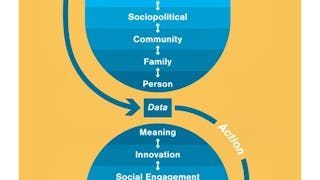This third of five courses explores topics related to the social determinants of health and health care systems. This course will also focus on the relationship between the social determinants of health, mental health, substance abuse, and trauma. The topics of this course include:


Social Determinants of Health: Health Care Systems
包含在 中
您将获得的技能
- Correlation Analysis
- Health Care
- Heat Maps
- Data Analysis
- Substance Abuse
- Trauma Care
- Community Mental Health Services
- Data Visualization
- Mental Health
- Health Policy
- Social Determinants Of Health
- Health Informatics
- Health Disparities
- Health Equity
- Public Health
- Healthcare Ethics
- Patient Education And Counseling
- Data Ethics
- Health Systems
要了解的详细信息
了解顶级公司的员工如何掌握热门技能

积累特定领域的专业知识
- 向行业专家学习新概念
- 获得对主题或工具的基础理解
- 通过实践项目培养工作相关技能
- 获得可共享的职业证书

该课程共有5个模块
This module will introduce the concept of health literacy, as we also examine how health literacy is measured. In lesson one, we will look at some of the social determinants of health that interact with health literacy, as we investigate the link between low health literacy and poor health outcomes. We will also review the Health Literacy Umbrella as a framework for improving health literacy, as we evaluate several policies, solutions, and perspectives for addressing disparities in health literacy. In lesson two, we will explore some of the resources available for measuring health literacy as we consider the many perspectives of health literacy measurement.
涵盖的内容
3个视频5篇阅读材料2个作业1个讨论话题5个插件
In this module, we will examine the impact of the social determinants of health on mental health and substance abuse. In lesson one, we will define mental health, as we look at the global prevalence and global burden of mental health disorders. This lesson will also focus on the global prevalence and global burden of substance abuse disorders, as we investigate influencing factors of drug use. Lesson two will introduce the life course approach to mental health, as we discuss both risk factors and protective factors that impact mental health. We will also consider how the social determinants of health contribute to mental health outcomes. Finally in lesson three, we will evaluate global, national, and regional policies and interventions for improving mental health outcomes.
涵盖的内容
4个视频10篇阅读材料2个作业1个讨论话题3个插件
In this module, we will look at the relationship between violence, conflict and trauma and the social determinants of health. In lesson one, we will define the different types of trauma, as we look at the global prevalence of violent and traumatic events. We will also focus on the effects of trauma and violence in vulnerable populations. Lesson two will explore Adverse Childhood Experiences in the context of social determinants of health. The impact of trauma on vulnerable countries and communities will also be examined. In lesson three, we will evaluate community resources, policies and interventions for addressing violence, conflict, and trauma in communities. We will also look at examples of effective interventions as we consider how to improve the social determinants of health and reduce trauma experiences.
涵盖的内容
3个视频9篇阅读材料2个作业1个讨论话题1个插件
This module will focus on the ethical considerations of addressing social determinants of health in health systems, and the ethical considerations of using SDOH-related data. In lesson one, we will explore the “Spheres of Influence'' framework in order to understand the ethical principles that guide how clinicians, health care organizations and communities should address SDOH. We will also examine the Public Health Code of Ethics, as we review the concept of health justice and health equity. In lesson two, we will evaluate the ethical considerations related to the use of SDOH data. We will also explore the five guiding principles proposed by the Executives for Health Innovation as part of the ethical framework for SDOH data. Finally, we will assess how the ethical frameworks discussed in this course can be applied to our course data sets, as we consider how our findings might be employed in a health system or to guide action to improve health.
涵盖的内容
2个视频4篇阅读材料2个作业1个讨论话题4个插件
This module will focus on analyzing, displaying and interpreting social determinants of health data, with a particular focus on identifying correlations between social determinants of health. Lesson one will provide an overview of correlation analysis and heat map visualization. In lesson two, we will learn how to calculate the Pearson correlation coefficient and create heatmaps in R. Using the NHANES dataset, we will look at the correlation between income, education, marital status, family savings, depression, insurance, household size, drinks per day, smoker, and body mass index. Using the Omaha System dataset, we will look at the correlation between the social determinants of health signs & symptoms. Finally, we will discuss how to interpret the results of our analysis as we visualize our findings using heatmaps.
涵盖的内容
2个视频4篇阅读材料1次同伴评审1个讨论话题1个非评分实验室4个插件
获得职业证书
将此证书添加到您的 LinkedIn 个人资料、简历或履历中。在社交媒体和绩效考核中分享。
位教师


从 Health Informatics 浏览更多内容
 状态:免费试用
状态:免费试用University of Minnesota
 状态:免费试用
状态:免费试用University of Michigan
 状态:免费试用
状态:免费试用University of Minnesota
 状态:免费试用
状态:免费试用University of Minnesota
人们为什么选择 Coursera 来帮助自己实现职业发展




常见问题
To access the course materials, assignments and to earn a Certificate, you will need to purchase the Certificate experience when you enroll in a course. You can try a Free Trial instead, or apply for Financial Aid. The course may offer 'Full Course, No Certificate' instead. This option lets you see all course materials, submit required assessments, and get a final grade. This also means that you will not be able to purchase a Certificate experience.
When you enroll in the course, you get access to all of the courses in the Specialization, and you earn a certificate when you complete the work. Your electronic Certificate will be added to your Accomplishments page - from there, you can print your Certificate or add it to your LinkedIn profile.
Yes. In select learning programs, you can apply for financial aid or a scholarship if you can’t afford the enrollment fee. If fin aid or scholarship is available for your learning program selection, you’ll find a link to apply on the description page.
更多问题
提供助学金,
¹ 本课程的部分作业采用 AI 评分。对于这些作业,将根据 Coursera 隐私声明使用您的数据。




